The Death of Wallenstein, Friedrich Schiller [learn to read books txt] 📗
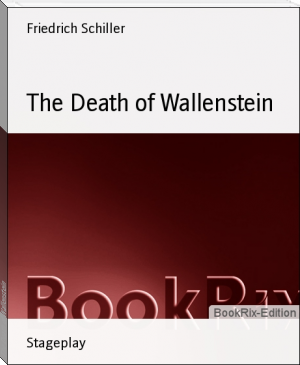
- Author: Friedrich Schiller
Book online «The Death of Wallenstein, Friedrich Schiller [learn to read books txt] 📗». Author Friedrich Schiller
I will myself be not far off.
DEVEREUX. But how do we get through Hartschier and Gordon, That stand on guard there in the inner chamber?
BUTLER. I have made myself acquainted with the place, I lead you through a back door that's defended By one man only. Me my rank and office Give access to the duke at every hour. I'll go before you - with one poinard-stroke Cut Hartschier's windpipe, and make way for you.
DEVEREUX. And when we are there, by what means shall we gain The duke's bed-chamber, without his alarming The servants of the court? for he has here A numerous company of followers.
BUTLER. The attendants fills the right wing: he hates bustle, And lodges in the left wing quite alone.
DEVEREUX. Were it well over - hey, Macdonald! I Feel queerly on the occasion, devil knows.
MACDONALD. And I, too. 'Tis too great a personage. People will hold us for a brace of villains.
BUTLER. In plenty, honor, splendor - you may safely Laugh at the people's babble.
DEVEREUX.
If the business Squares with one's honor - if that be quite certain.
BUTLER. Set your hearts quite at ease. Ye save for Ferdinand His crown and empire. The reward can be No small one.
DEVEREUX. And 'tis his purpose to dethrone the emperor?
BUTLER. Yes! Yes! to rob him of his crown and life.
DEVEREUX. And must he fall by the executioner's hands, Should we deliver him up to the emperor Alive?
BUTLER.
It were his certain destiny.
DEVEREUX. Well! Well! Come then, Macdonald, he shall not Lie long in pain.
[Exeunt BUTLER through one door, MACDONALD and DEVEREUX
through the other.
SCENE III.
A saloon, terminated by a gallery, which extends far
into the background.
WALLENSTIN sitting at a table. The SWEDISH CAPTAIN
standing before him.
WALLENSTEIN. Commend me to your lord. I sympathize In his good fortune; and if you have seen me Deficient in the expressions of that joy, Which such a victory might well demand, Attribute it to no lack of good-will, For henceforth are our fortunes one. Farewell, And for your trouble take my thanks. To-morrow The citadel shall be surrendered to you On your arrival.
[The SWEDISH CAPTAIN retires. WALLENSTEIN sits lost in thought,
his eyes fixed vacantly, and his head sustained by his hand. The
COUNTESS TERZKY enters, stands before him for awhile, unobserved
by him; at length he starts, sees her and recollects himself.
WALLENSTEIN. Comest thou from her? Is she restored? How is she?
COUNTESS. My sister tells me she was more collected After her conversation with the Swede. She has now retired to rest.
WALLENSTEIN.
The pang will soften She will shed tears.
COUNTESS.
I find thee altered, too, My brother! After such a victory I had expected to have found in thee A cheerful spirit. Oh, remain thou firm! Sustain, uphold us! For our light thou art, Our sun.
WALLENSTEIN.
Be quiet. I ail nothing. Where's Thy husband?
COUNTESS.
At a banquet - he and Illo.
WALLENSTEIN (rises and strides across the saloon). The night's far spent. Betake thee to thy chamber.
COUNTESS. Bid me not go, oh, let me stay with thee!
WALLENSTEIN (moves to the window). There is a busy motion in the heaven, The wind doth chase the flag upon the tower, Fast sweep the clouds, the sickle [11] of the moon, Struggling, darts snatches of uncertain light. No form of star is visible! That one White stain of light, that single glimmering yonder, Is from Cassiopeia, and therein Is Jupiter. (A pause.) But now The blackness of the troubled element hides him!
[He sinks into profound melancholy, and looks vacantly
into the distance.
COUNTESS (looks on him mournfully, then grasps his hand). What art thou brooding on?
WALLENSTEIN.
Methinks If I but saw him, 'twould be well with me. He is the star of my nativity, And often marvellously hath his aspect Shot strength into my heart.
COUNTESS. Thou'lt see him again.
WALLENSTEIN (remains for awhile with absent mind, then assumes a livelier manner, and turning suddenly to the COUNTESS). See him again? Oh, never, never again!
COUNTESS. How?
WALLENSTEIN.
He is gone - is dust.
COUNTESS.
Whom meanest thou, then?
WALLENSTEIN. He, the more fortunate! yea, he hath finished! For him there is no longer any future, His life is bright - bright without spot it was, And cannot cease to be. No ominous hour Knocks at his door with tidings of mishap, Far off is he, above desire and fear; No more submitted to the change and chance Of the unsteady planets. Oh, 'tis well With him! but who knows what the coming hour Veiled in thick darkness brings us?
COUNTESS. Thou speakest of Piccolomini. What was his death? The courier had just left thee as I came.
[WALLENSTEIN by a motion of his hand makes signs to her
to be silent.
Turn not thine eyes upon the backward view, Let us look forward into sunny days, Welcome with joyous heart the victory, Forget what it has cost thee. Not to-day, For the first time, thy friend was to thee dead; To thee he died when first he parted from thee.
WALLENSTEIN. This anguish will be wearied down [12], I know; What pang is permanent with man? From the highest, As from the vilest thing of every day, He learns to wean himself: for the strong hours Conquer him. Yet I feel what I have lost In him. The bloom is vanished from my life, For oh, he stood beside me, like my youth, Transformed for me the real to a dream, Clothing the palpable and the familiar With golden exhalations of the dawn, Whatever fortunes wait my future toils, The beautiful is vanished - and returns not.
COUNTESS. Oh, be not treacherous to thy own power. Thy heart is rich enough to vivify Itself. Thou lovest and prizest virtues in him, The which thyself didst plant, thyself unfold.
WALLENSTEIN (stepping to the door). Who interrupts us now at this late hour? It is the governor. He brings the keys Of the citadel. 'Tis midnight. Leave me, sister!
COUNTESS. Oh, 'tis so hard to me this night to leave thee; A boding fear possesses me!
WALLENSTEIN.
Fear! Wherefore?
COUNTESS. Shouldst thou depart this night, and we at waking Never more find thee!
WALLENSTEIN.
Fancies!
COUNTESS.
Ob, my soul Has long been weighed down by these dark forebodings, And if I combat and repel them waking, They still crush down upon my heart in dreams, I saw thee, yesternight with thy first wife Sit at a banquet, gorgeously attired.
WALLENSTHIN. This was a dream of favorable omen, That marriage being the founder of my fortunes.
COUNTESS. To-day I dreamed that I was seeking thee In thy own chamber. As I entered, lo! It was no more a chamber: the Chartreuse At Gitschin 'twas, which thou thyself hast founded, And where it is thy will that thou shouldst be Interred.
WALLENSTEIN.
Thy soul is busy with these thoughts.
COUNTESS. What! dost thou not believe that oft in dreams A voice of warning speaks prophetic to us?
WALLENSTEIN. There is no doubt that there exist such voices, Yet I would not call them Voices of warning that announce to us Only the inevitable. As the sun, Ere it is risen, sometimes paints its image In the atmosphere, so often do the spirits Of great events stride on before the events, And in to-day already walks to-morrow. That which we read of the fourth Henry's death Did ever vex and haunt me like a tale Of my own future destiny. The king Felt in his breast the phantom of the knife Long ere Ravaillac armed himself therewith. His quiet mind forsook him; the phantasma Started him in his Louvre, chased him forth Into the open air; like funeral knells Sounded that coronation festival; And still with boding sense he heard the tread Of those feet that even then were seeking him Throughout the streets of Paris.
COUNTESS.
And to thee The voice within thy soul bodes nothing?
WALLENSTEIN.
Nothing. Be wholly tranquil.
COUNTESS.
And another time I hastened after thee, and thou rann'st from me Through a long suite, through many a spacious hall. There seemed no end of it; doors creaked and clapped; I followed panting, but could not overtake thee; When on a sudden did I feel myself Grasped from behind, - the hand was cold that grasped me; 'Twas thou, and thou didst kiss me, and there seemed A crimson covering to envelop us.
WALLENSTEIN. That is the crimson tapestry of my chamber.
COUNTESS (gazing on him). If it should come to that - if I should see thee, Who standest now before me in the fulness Of life - -
[She falls on his breast and weeps.
WALLENSTEIN. The emperor's proclamation weighs upon thee - Alphabets wound not - and he finds no hands.
COUNTESS. If he should find them, my resolve is taken - I bear about me my support and refuge.
[Exit COUNTESS.
SCENE V.
WALLENSTEIN, GORDON.
WALLENSTEIN. All quiet in the town?
GORDON.
The town is quiet.
WALLENSTEIN. I hear a boisterous music! and the castle Is lighted up. Who are the revellers?
GORDON. There is a banquet given at the castle To the Count Terzky and Field-Marshal Illo.
WALLENSTEIN. In honor of the victory - this tribe Can show their joy in nothing else but feasting.
[Rings. The GROOM OF THE CHAMBER enters. Unrobe me. I will lay me down to sleep.
[WALLENSTEIN takes the keys from GORDON. So we are guarded from all enemies, And shut in with sure friends. For all must cheat me, or a face like this
[Fixing his eyes on GORDON. Was ne'er a hypocrite's mask.
[The GROOM OF THE CHAMBER takes off his mantle, collar, and scarf.
WALLENSTEIN. Take care - what is that?
GROOM OF THE
DEVEREUX. But how do we get through Hartschier and Gordon, That stand on guard there in the inner chamber?
BUTLER. I have made myself acquainted with the place, I lead you through a back door that's defended By one man only. Me my rank and office Give access to the duke at every hour. I'll go before you - with one poinard-stroke Cut Hartschier's windpipe, and make way for you.
DEVEREUX. And when we are there, by what means shall we gain The duke's bed-chamber, without his alarming The servants of the court? for he has here A numerous company of followers.
BUTLER. The attendants fills the right wing: he hates bustle, And lodges in the left wing quite alone.
DEVEREUX. Were it well over - hey, Macdonald! I Feel queerly on the occasion, devil knows.
MACDONALD. And I, too. 'Tis too great a personage. People will hold us for a brace of villains.
BUTLER. In plenty, honor, splendor - you may safely Laugh at the people's babble.
DEVEREUX.
If the business Squares with one's honor - if that be quite certain.
BUTLER. Set your hearts quite at ease. Ye save for Ferdinand His crown and empire. The reward can be No small one.
DEVEREUX. And 'tis his purpose to dethrone the emperor?
BUTLER. Yes! Yes! to rob him of his crown and life.
DEVEREUX. And must he fall by the executioner's hands, Should we deliver him up to the emperor Alive?
BUTLER.
It were his certain destiny.
DEVEREUX. Well! Well! Come then, Macdonald, he shall not Lie long in pain.
[Exeunt BUTLER through one door, MACDONALD and DEVEREUX
through the other.
SCENE III.
A saloon, terminated by a gallery, which extends far
into the background.
WALLENSTIN sitting at a table. The SWEDISH CAPTAIN
standing before him.
WALLENSTEIN. Commend me to your lord. I sympathize In his good fortune; and if you have seen me Deficient in the expressions of that joy, Which such a victory might well demand, Attribute it to no lack of good-will, For henceforth are our fortunes one. Farewell, And for your trouble take my thanks. To-morrow The citadel shall be surrendered to you On your arrival.
[The SWEDISH CAPTAIN retires. WALLENSTEIN sits lost in thought,
his eyes fixed vacantly, and his head sustained by his hand. The
COUNTESS TERZKY enters, stands before him for awhile, unobserved
by him; at length he starts, sees her and recollects himself.
WALLENSTEIN. Comest thou from her? Is she restored? How is she?
COUNTESS. My sister tells me she was more collected After her conversation with the Swede. She has now retired to rest.
WALLENSTEIN.
The pang will soften She will shed tears.
COUNTESS.
I find thee altered, too, My brother! After such a victory I had expected to have found in thee A cheerful spirit. Oh, remain thou firm! Sustain, uphold us! For our light thou art, Our sun.
WALLENSTEIN.
Be quiet. I ail nothing. Where's Thy husband?
COUNTESS.
At a banquet - he and Illo.
WALLENSTEIN (rises and strides across the saloon). The night's far spent. Betake thee to thy chamber.
COUNTESS. Bid me not go, oh, let me stay with thee!
WALLENSTEIN (moves to the window). There is a busy motion in the heaven, The wind doth chase the flag upon the tower, Fast sweep the clouds, the sickle [11] of the moon, Struggling, darts snatches of uncertain light. No form of star is visible! That one White stain of light, that single glimmering yonder, Is from Cassiopeia, and therein Is Jupiter. (A pause.) But now The blackness of the troubled element hides him!
[He sinks into profound melancholy, and looks vacantly
into the distance.
COUNTESS (looks on him mournfully, then grasps his hand). What art thou brooding on?
WALLENSTEIN.
Methinks If I but saw him, 'twould be well with me. He is the star of my nativity, And often marvellously hath his aspect Shot strength into my heart.
COUNTESS. Thou'lt see him again.
WALLENSTEIN (remains for awhile with absent mind, then assumes a livelier manner, and turning suddenly to the COUNTESS). See him again? Oh, never, never again!
COUNTESS. How?
WALLENSTEIN.
He is gone - is dust.
COUNTESS.
Whom meanest thou, then?
WALLENSTEIN. He, the more fortunate! yea, he hath finished! For him there is no longer any future, His life is bright - bright without spot it was, And cannot cease to be. No ominous hour Knocks at his door with tidings of mishap, Far off is he, above desire and fear; No more submitted to the change and chance Of the unsteady planets. Oh, 'tis well With him! but who knows what the coming hour Veiled in thick darkness brings us?
COUNTESS. Thou speakest of Piccolomini. What was his death? The courier had just left thee as I came.
[WALLENSTEIN by a motion of his hand makes signs to her
to be silent.
Turn not thine eyes upon the backward view, Let us look forward into sunny days, Welcome with joyous heart the victory, Forget what it has cost thee. Not to-day, For the first time, thy friend was to thee dead; To thee he died when first he parted from thee.
WALLENSTEIN. This anguish will be wearied down [12], I know; What pang is permanent with man? From the highest, As from the vilest thing of every day, He learns to wean himself: for the strong hours Conquer him. Yet I feel what I have lost In him. The bloom is vanished from my life, For oh, he stood beside me, like my youth, Transformed for me the real to a dream, Clothing the palpable and the familiar With golden exhalations of the dawn, Whatever fortunes wait my future toils, The beautiful is vanished - and returns not.
COUNTESS. Oh, be not treacherous to thy own power. Thy heart is rich enough to vivify Itself. Thou lovest and prizest virtues in him, The which thyself didst plant, thyself unfold.
WALLENSTEIN (stepping to the door). Who interrupts us now at this late hour? It is the governor. He brings the keys Of the citadel. 'Tis midnight. Leave me, sister!
COUNTESS. Oh, 'tis so hard to me this night to leave thee; A boding fear possesses me!
WALLENSTEIN.
Fear! Wherefore?
COUNTESS. Shouldst thou depart this night, and we at waking Never more find thee!
WALLENSTEIN.
Fancies!
COUNTESS.
Ob, my soul Has long been weighed down by these dark forebodings, And if I combat and repel them waking, They still crush down upon my heart in dreams, I saw thee, yesternight with thy first wife Sit at a banquet, gorgeously attired.
WALLENSTHIN. This was a dream of favorable omen, That marriage being the founder of my fortunes.
COUNTESS. To-day I dreamed that I was seeking thee In thy own chamber. As I entered, lo! It was no more a chamber: the Chartreuse At Gitschin 'twas, which thou thyself hast founded, And where it is thy will that thou shouldst be Interred.
WALLENSTEIN.
Thy soul is busy with these thoughts.
COUNTESS. What! dost thou not believe that oft in dreams A voice of warning speaks prophetic to us?
WALLENSTEIN. There is no doubt that there exist such voices, Yet I would not call them Voices of warning that announce to us Only the inevitable. As the sun, Ere it is risen, sometimes paints its image In the atmosphere, so often do the spirits Of great events stride on before the events, And in to-day already walks to-morrow. That which we read of the fourth Henry's death Did ever vex and haunt me like a tale Of my own future destiny. The king Felt in his breast the phantom of the knife Long ere Ravaillac armed himself therewith. His quiet mind forsook him; the phantasma Started him in his Louvre, chased him forth Into the open air; like funeral knells Sounded that coronation festival; And still with boding sense he heard the tread Of those feet that even then were seeking him Throughout the streets of Paris.
COUNTESS.
And to thee The voice within thy soul bodes nothing?
WALLENSTEIN.
Nothing. Be wholly tranquil.
COUNTESS.
And another time I hastened after thee, and thou rann'st from me Through a long suite, through many a spacious hall. There seemed no end of it; doors creaked and clapped; I followed panting, but could not overtake thee; When on a sudden did I feel myself Grasped from behind, - the hand was cold that grasped me; 'Twas thou, and thou didst kiss me, and there seemed A crimson covering to envelop us.
WALLENSTEIN. That is the crimson tapestry of my chamber.
COUNTESS (gazing on him). If it should come to that - if I should see thee, Who standest now before me in the fulness Of life - -
[She falls on his breast and weeps.
WALLENSTEIN. The emperor's proclamation weighs upon thee - Alphabets wound not - and he finds no hands.
COUNTESS. If he should find them, my resolve is taken - I bear about me my support and refuge.
[Exit COUNTESS.
SCENE V.
WALLENSTEIN, GORDON.
WALLENSTEIN. All quiet in the town?
GORDON.
The town is quiet.
WALLENSTEIN. I hear a boisterous music! and the castle Is lighted up. Who are the revellers?
GORDON. There is a banquet given at the castle To the Count Terzky and Field-Marshal Illo.
WALLENSTEIN. In honor of the victory - this tribe Can show their joy in nothing else but feasting.
[Rings. The GROOM OF THE CHAMBER enters. Unrobe me. I will lay me down to sleep.
[WALLENSTEIN takes the keys from GORDON. So we are guarded from all enemies, And shut in with sure friends. For all must cheat me, or a face like this
[Fixing his eyes on GORDON. Was ne'er a hypocrite's mask.
[The GROOM OF THE CHAMBER takes off his mantle, collar, and scarf.
WALLENSTEIN. Take care - what is that?
GROOM OF THE
Free e-book «The Death of Wallenstein, Friedrich Schiller [learn to read books txt] 📗» - read online now
Similar e-books:
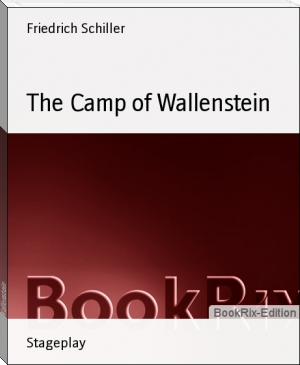
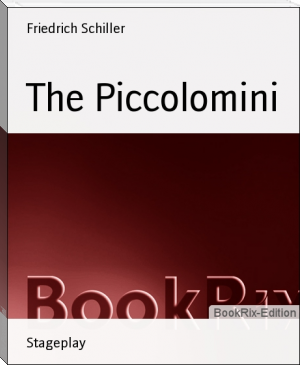
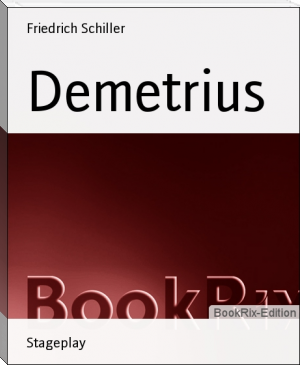
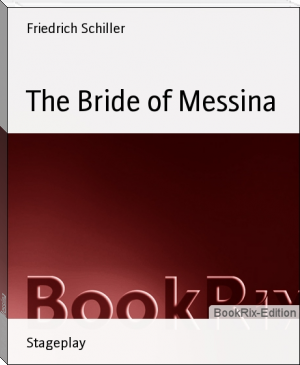
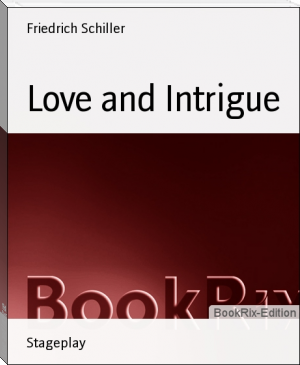
Comments (0)